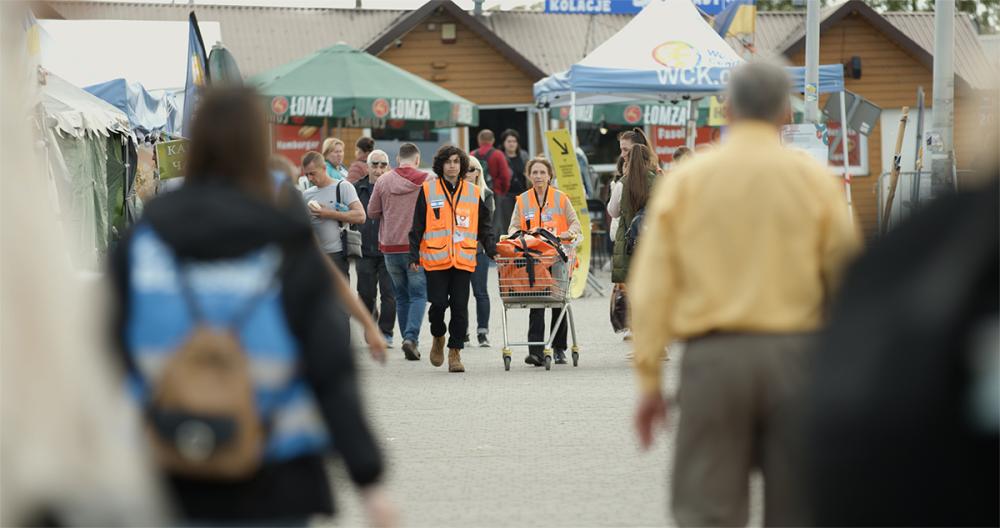
Transplant surgeon Dr. Robert Montgomery, second from right, traveled to Ukraine’s largest functioning transplant center to help perform lifesaving surgeries with his Ukrainian counterparts.
Photo: Dr. Montgomery
When the war in Ukraine began in late February 2022, many felt the urge to help. Two NYU Langone Health faculty members showed selflessness and dedication by going to Ukraine—one delivered medications and cared for refugees at the Polish border, and the other performed lifesaving surgeries at a Ukrainian hospital.
Paula J. Rackoff, MD, a rheumatologist and clinical associate professor in the Department of Medicine at NYU Grossman School of Medicine, was planning a bike trip in Europe when the news broke that Russia had invaded Ukraine. “I contacted my friends and said, ‘I don’t think I can go on this trip—I want to volunteer,’” says Dr. Rackoff, who has previously done medical relief work around the world. She reached out to a number of aid groups and got a response from One Heart, an Israeli organization that is helping refugees on the border of Poland and Ukraine.
Her next call was to leaders at NYU Langone, to ask if the health system would donate basic medications that would be in short supply for those fleeing from Russian forces. “At every step of the way with NYU Langone, it was yes, yes, yes,” says Dr. Rackoff. “I got a list of medications that were needed by refugees and by hospitals in Ukraine, and NYU Langone sent me with five full duffel bags.”
On May 27, Dr. Rackoff arrived in Poland and traveled to the Ukrainian border. Over the course of 9 days, she and 3 other doctors from the New York City area saw more than 300 patients at 4 refugee centers—3 in Poland and 1 in Lviv across the Ukrainian border, where she and other volunteers also delivered medications to a hospital.
Robert Montgomery, MD, DPhil, chair of the Department of Surgery at NYU Grossman School of Medicine and director of the NYU Langone Transplant Institute, also made his journey to Ukraine in May. His destination was the war-torn country’s largest functioning transplant center, where he planned to work alongside his Ukrainian counterparts.
“I was deeply affected by the invasion and moved by it,” Dr. Montgomery says. “I knew it would have tremendous implications for the Ukrainian people and that we were in a moment of history that would redefine the world order.”
Under Cover of Night
Dr. Montgomery contacted a longtime friend and transplant nephrologist in Poland. Giving little notice to even his family for security reasons, on May 8 he flew from New York to Frankfurt, Germany, then to Krakow, Poland, where he met his colleague.
The pair headed toward the Ukrainian border, taking two trains and arriving after dark. It took hours to make their way through border control, where Ukrainian colleagues required them to install a sophisticated mobile app that provides advance warning of incoming missile strikes. Then, under cover of night, the two physicians headed to Lviv.
“Along the road we were stopped several times,” Dr. Montgomery says. “One of the most remarkable things was just how dark it is at night. All lights are purposefully kept off. So you’re approaching this sprawling city that is utterly black.”
Desperate Circumstances
In a country hurting for resources, there is a lack of access to medical care—even outside of where the fighting is concentrated.
And while Ukrainians in Poland can receive medical care there, the complexities of access, along with high demand, mean that not all those who need care are able to get it. “The refugees still have the same medical problems they had in Ukraine, but worse,” says Dr. Rackoff. “Many of them have high blood pressure and left home with only one month of medication, which has since run out. That was the most common issue we saw, along with headache, insomnia, and anxiety.”
Inside Ukraine, Dr. Montgomery was especially moved by the number of amputees, many of whom were soldiers whose families fled to safety while they opted to stay and fight. While there, Dr. Montgomery did what he could to help ease the suffering. He performed three kidney transplants and assisted in planning a heart transplant.
“We worked hard day and night. We were shoulder to shoulder in the operating room, working together to care for these patients,” he says.
Plans to Do More
“I want to continue doing what I can to make a difference after what I saw there,” Dr. Montgomery says. “They are in desperate need of medical supplies, prosthesis, and support for the many people injured in the war. When you walk through the ICUs you really get a sense of the incredible human toll.”
One Heart is sending delegations to the border every month, and Dr. Rackoff plans to return for another week this summer.

